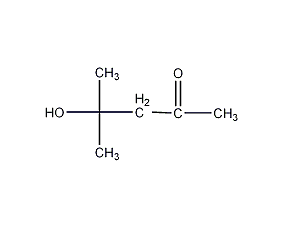
Structural formula
| Business number | 03GQ |
|---|---|
| Molecular formula | C6H12O2 |
| Molecular weight | 116.16 |
| label |
2-Methyl-4-oxo-2-pentanol, diacetone alcohol, Methyl pentanol, diacetone alcohol, Hydroxymethylpentanone, 2-Methyl-4-oxo-2-pentanol, Diacetone alcohol, Methyl amyl ketone alcohol, Pyranton, High boiling point organic solvents, resin solvent, paint stripper |
Numbering system
CAS number:123-42-2
MDL number:MFCD00004471
EINECS number:204-626-7
RTECS number:SA9100000
BRN number:1740440
PubChem number:24858962
Physical property data
1. Properties: Colorless flammable liquid with slight mint gas.
2. Boiling point (ºC, 101.3kPa): 168
3. Melting point (freezing point) (ºC): -44
4. Relative density (g /mL, 20/4ºC): 0.9387
5. Relative density (25℃, 4℃): 0.8460120
6. Relative vapor density ( g/mL, air=1): 4
7. Refractive index (20ºC): 1.4235
8. Refractive index (25ºC): 1.4219
9 . Viscosity (mPa·s, 20ºC): 2.9
10. Flash point (ºC, closed): 64.44
11. Flash point (ºC, open): 56
12. Heat of evaporation (KJ/mol, 30~110ºC): 47.7295
13. Heat of combustion (KJ/mol): 4186.8
14. Specific heat capacity (KJ/ (kg·K), 20ºC, constant pressure): 1.88
15. Vapor pressure (kPa, 25ºC): 0.2266
16. Vapor pressure (kPa, 61.7ºC): 1.7332
17. Body expansion coefficient (K-1, 20ºC): 0.00099
18. Solubility: can be mixed with water, alcohol, ether, ketone, It is miscible with various solvents such as esters, aromatic hydrocarbons, and halogenated hydrocarbons, but is not miscible with higher aliphatic hydrocarbons.
Toxicological data
- Toxicity classification Poisoning
- Acute toxicity; oral – rat LD50: 4000 mg/kg; oral – mouse LC50: 3950 mg/kg; rabbit dermal LD50: 13.6g/kg .
- Irritation data: Skin – Rabbit 500 mg Mild; Eyes – Rabbit 20 mg Severe.
- Less irritating to the skin. Repeatedly for a long time. In this way, the reaction bed can control the optimal reaction temperature while always maintaining a high reactant concentration. The product is enriched in the distillation kettle and discharged from the system through the discharge pipe. The process conditions are: reaction bed temperature 50-55°C, feed rate 0.50L/h, distillation kettle boiling temperature 65-75°C. The DA content in the kettle liquid is 25%-60%.

Refining method: use anhydrous sulfuric acid After the calcium is dried, it is fractionated under reduced pressure at a pressure of 2.6664kPa.

Purpose
1. Diacetone alcohol is an intermediate in the process of producing isopropylacetone, methyl isobutyl ketone, methyl isobutyl carbinol, hexanediol, phorone and isophorone from acetone. Diacetone alcohol can be used to prepare metal cleaners, wood preservatives, photographic film and pharmaceutical preservatives, antifreeze, hydraulic oil solvents, extractants and fiber finishing agents, etc. Diacetone alcohol is widely used as a solvent for electrostatic spray paint, celluloid, nitrocellulose, fats, greases, waxes and resins. Diacetone alcohol is a high boiling point organic solvent. Low viscosity, temperature has little effect on viscosity. Used as solvent and paint remover for cellulose ester paint, printing ink, synthetic resin paint, etc.
2.Widely used as solvent for resin, electrostatic spray paint, celluloid, nitrocellulose, fat, grease and wax, etc. It is also used to prepare metal cleaners, wood preservatives, photographic film and pharmaceutical preservatives, antifreeze, hydraulic oil solvents, extraction agents and fiber finishing agents, etc. It is also an
intermediate in organic synthesis.3. Cosmetic solvents are mainly used as high boiling point solvents for cosmetics such as nail polish. It is usually used as a mixed solvent with low boiling point solvents and medium boiling point solvents to obtain suitable evaporation speed and viscosity.

 微信扫一扫打赏
微信扫一扫打赏

